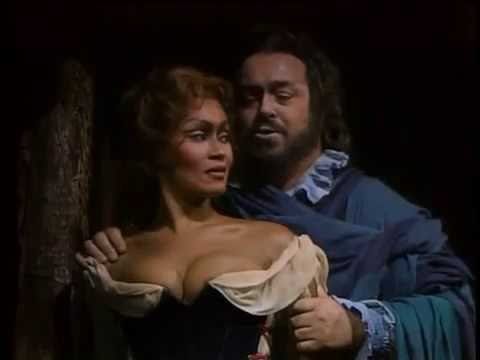Opera Daily 🎶 — Rigoletto
This week's Opera Daily features the quartet from Act 3 of the Italian opera Rigoletto by Giuseppe Verdi
👋 Hello to the new Opera Daily subscribers who have joined us this week. I hope you’re sitting on a plushy couch with a warm beverage and enjoying your weekend. You can check out the complete Opera Daily archives and the playlist on YouTube for more selections. If you were forwarded this email by a friend, join us by subscribing here:
Today we’re listening to…
“Bella figlia dell’amore” the quartet from Act 3 of the Italian opera Rigoletto by Giuseppe Verdi.
Verdi's Rigoletto is probably the most accessible opera for beginners (nice and short, too—2 hours total!). And yet it also never fails to move me with one beautiful moment after another and the accessibility of the story.
🎧 Listening Example: (6 minute listen): Tenor Luciano Pavarotti (The Duke of Mantua), Mezzo-soprano Isola Jones (Maddalena), Soprano Joan Sutherland (Gilda), and Baritone Leo Nucci (Rigoletto) are singing the quartet “Bella figlia dell'amore” from Act 3 of the Italian opera Rigoletto by Giuseppe Verdi, The Metropolitan Opera Orchestra and Chorus/Richard Bonynge, Recorded live, The Metropolitan Opera, New York, January, 1987
Rigoletto
Verdi’s skill at depicting complex characters and their frame of mind throughout this quartet reminds me of what makes opera (and Verdi) unique.
The story of Rigoletto (Ree-go-leH-toe) revolves around the Duke of Mantua and his Court Jester, Rigoletto, whose daughter, Gilda, falls for a curse. Rigoletto has kept his daughter hidden to protect her, but Gilda has fallen in love with the Duke, who disguised himself as a poor student.
In order to show Gilda the Duke’s true nature, Rigoletto brings Gilda to see the Duke seducing Maddalena.
You are now convinced he was lying.
Hush, and leave it up to me to hasten our revenge.
It will be quick, it will be deadly, I know how to deal with him.
Gilda vows that she still loves him; meanwhile, Rigoletto has hired an assassin to kill the Duke, but Gilda, in an attempt to save the Duke, is stabbed instead. 😳 Rigoletto, thinking he has the body of the Duke, finds Gilda near death, asking for forgiveness.
Want more?
Rigoletto is one of Verdi's most popular operas, along with La Traviata and Il Trovatore. These three operas, all composed in a span of just two years (1851-1853), are sometimes referred to as the “popular trilogy.”
During Verdi's time, the government censored Italian opera houses and wouldn’t allow for a new work in which a king was portrayed as a seducer! So Verdi and his librettist Francesco Piave reduced their bad guy from king to Duke, and they allowed them to open on March 11th, 1851.
Verdi’s operas are a great example of music from the Romantic Period (1815-1910), a time when musicians loved to use music to tell expressive stories.
Verdi played a significant role in the unification of Italy. His music was frequently used as a symbol of Italian nationalism, and his name itself was used as an acronym for Vittorio Emanuele Re D’Italia (Victor Emmanuel, King of Italy), the first king of united Italy. Born alongside Italy’s press for nationhood, Verdi’s operas provided Italians with the music that expressed the passion for their cause and became an important part of Italy’s national identity.
During the two days before Verdi’s death, Milan officials covered the street outside his home with straw so the sound of horse hooves would not disturb his rest. He died on January 27, 1901.
Thank you for reading (and listening),
Michele
PS. If you missed last week’s selection, we featured Grace Bumbry, a true legend of opera.
❤️ If you enjoyed this selection, please hit the heart to like it (and share it too!)



Thank u ! Having say that I was lucky enough 2 b at Glynbourme in 1973 4 Josephine Barstow 'lady Macbeth' performance!!! And follow her career ever since crowned with Gloriana ! And i'm not a B. Britten fan!What a fantastic singer !
One of the supreme gifts opera brought to the world was this ability to characterize in music the personality or inner thoughts of the characters even, and perhaps especially, when what one sees on the stage or hears in the text is incongruent with what characters are thinking or feeling. Perhaps only Sondheim could do this as well as the great opera composers. Thus I especially love the trios and quartets of Mozart (Figaro, Giovanni, Cosi) Rossini (Barber), Donizetti (Lucia & that incredible sextet), Verdi, Puccini (Boheme Acts 2 & 3), and Strauss (the glorious Final Trio of Rosenkavalier perhaps my most favorite moment in all opera).